As 2024 slips through its twilight days, the events of the past fortnight have been characteristic of a very turbulent year.
Within days of each other, the French and German governments either collapsed or lost a prime minister, both in their own ways having lurched through episodic destabilisations throughout the year.
A deeply volatile Middle East was jolted by the collapse of the Assad regime and the emergence of a political-military force once linked to al-Qaeda.
While the ceasefire between Israel and Hezbollah in Lebanon in late November provided a rare moment of respite, the sheer destructive force of the Israeli-Palestinian conflict continues to resonate throughout the region, simultaneously contaminating European domestic politics.
Russia continues to deliberately destroy civilian infrastructure across Ukraine and Ukraine's defences have been buckling in the Donetsk region under the pressure of Moscow's superior manpower.
Russian troops are moving faster than at any time since Vladimir Putin launched his invasion in 2022.
Three weeks after the birth of 2025, the European Union will be confronted with the vision most capitals were petrified by throughout 2024: Donald Trump returning to the White House, an outcome that could - potentially - have extremely negative consequences for Ukraine and Europe in general.
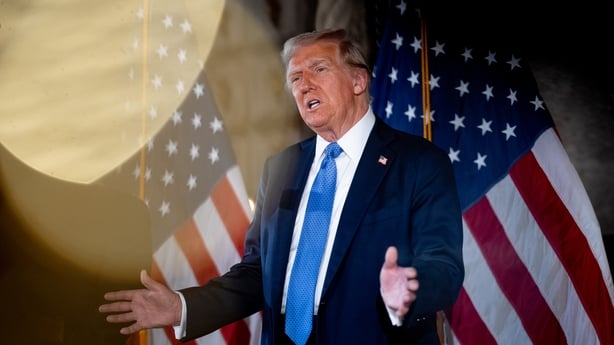
Even back in January, the prospects for Europe in 2024 did not look great.
In Davos, Switzerland, the World Economic Forum's Global Risk report reflected the sober mood.
Only 16% of respondents expected a calm and stable outlook for 2024/5: after the hottest Northern Hemisphere summer in history in 2023, there was widespread fear about extreme weather events, AI-generated misinformation and disinformation, societal and political polarisation.
The cost of living, disruption to supply chains for food and energy further darkened the political mood.
"These risks are serious because they limit our ability to tackle the big global challenges we are facing," European Commission President Ursula von der Leyen told delegates at the Swiss mountain resort.
"Changes in our climate and our geopolitical climate, shifts in our demography and in our technology. Spiraling regional conflicts and intensified geopolitical competition, and their impacts on supply chains.
"The sobering reality is that we are once again competing more intensely across countries than we have in several decades."
Some of these fears came to pass in 2024.
Extreme weather events
There was an increase in blizzards, cold waves, droughts, heat waves, wildfires, floods, tornadoes, and tropical cyclones.
For the first time ever, the earth's temperature averaged 1.50C above the pre-industrial baseline every month in the 12 months to June, while in Europe the average was 1.54C, the highest ever.
According to the European Environment Agency, over 370,000 hectares were destroyed by wildfires in the first nine months of 2024, while two million people in Central Europe were affected by flooding in September alone (in October, 230 people died in devastating flash floods in Valencia).
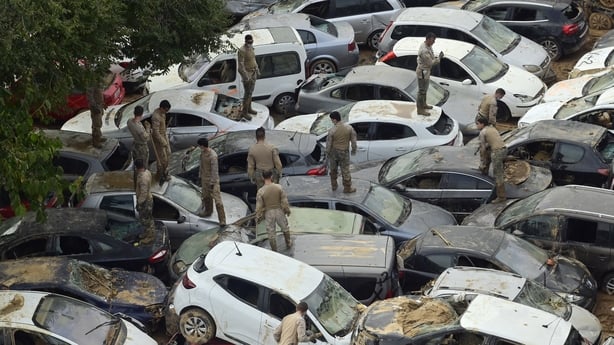
Swing towards far right parties
Yet, 2024 also saw a swing in support for climate-denying, right-wing and far right parties (which are also likely to be more supportive of Russia) deepening that anxiety which grips the political centre about cognitive dissonance: the greater the threats to human stability, the more voters seem to gravitate to parties perpetuating instability, and turning their backs on those parties trying to alleviate it.
Fears of a shift to the far right in June’s European elections were largely justified, although the centre-ground just about held, thanks to the strong performance of the European People's Party (EPP).
Thanks to the return of 189 MEPs from a combination of the far right and hard right, the EPP has already begun to tack away from the centre on environmental legislation.
The slump in support for the centrist Renew group, French president Emmanuel Macron’s vehicle in the European Parliament, further eroded the centre ground and would go on to store up the debilitating political turmoil in France which followed Mr Macron’s decision to dissolve the National Assembly as a result of the European vote.
In November, the victory out of nowhere - later annulled - of the far right pro-Moscow candidate Călin Georgescu in the Romanian presidential elections encouraged fears of a witch's brew of climate-change denial, social media disinformation and pro-Russian sentiment seriously manipulating the electoral process in Europe.
Elections in Moldova and Georgia, where there were widespread allegations of Kremlin influence campaigns, have only added to the sense of paranoia.
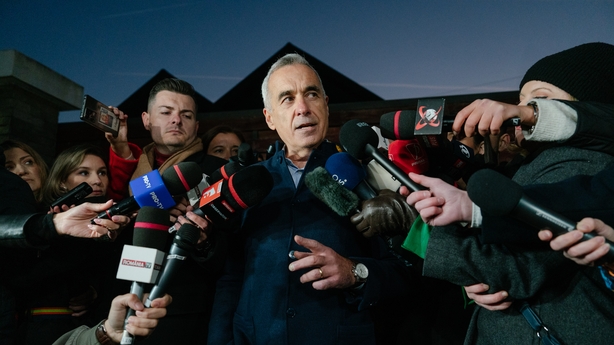
Clamping down on massive disinformation campaigns by external actors is a troubled work in progress for the EU.
The Digital Services Act (DSA) means platforms willingly or unwittingly hosting such campaigns can face massive fines, but it has yet to deliver real results (US vice-president elect JD Vance threatened to pull the US out of NATO if the EU takes Elon Musk’s X platform to task under the act).
"When you add in the roll out of AI by fabulously wealthy corporations all clamouring to be first, the potential for manipulation of the political space increases tenfold."
The most daunting mission for Ireland’s commissioner Michael McGrath in 2025 will be the launch of the so-called Democracy Shield, an initiative linking various pieces of legislation to counter foreign information manipulation and interference.
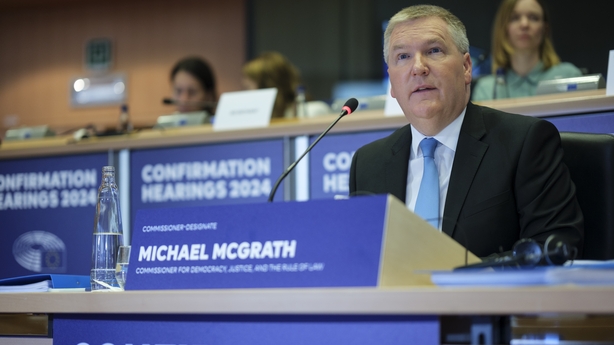
Over the course of a decade, the digital information sphere became the public space for debate, but it also a geostrategic battleground with outside actors such as Russia using sophisticated algorithms to manipulate public opinion and foment division.
When you add in the roll out of AI by fabulously wealthy corporations all clamouring to be first, the potential for manipulation of the political space increases tenfold.
Of course, in a democracy voters are perfectly entitled to choose parties that sharply deviate from the political status quo if they feel those parties are not delivering security and prosperity.
Number of migrants rises
In Europe, lingering grievances dating back to globalisation and the financial crisis have fused with more acute concerns about the migration wave triggered by the Syrian civil war in 2015.
While 1.3 million people sought asylum in Europe that year, the numbers have climbed steadily since the pandemic.
Last year over one million arrived from the Middle East and North Africa, separate from the 4.3m Ukrainian refugees who have fled Russia's war.
These figures have coincided with a steady rise in support for the far right, even if migrants are not necessarily responsible for greater difficulties in voters’ lives.
A team of researchers in Italy reported in a paper for the Harvard Business School that far-right parties were able to successfully exploit a particular government reform which reduced access to public services in small towns and villages with a population of roughly 5,000 people.
The parties were able to link this sense of anger with migration to the extent that migrants were blamed, rather than the "public service deprivation" caused by the reform in the first place.
"By exploiting [the reform]...," the researchers concluded, "far-right support in national elections increased more after the reform in affected municipalities than in unaffected ones.
"In advanced industrial democracies like Italy, people are accustomed to having access to local public services and expect the state to be responsive to their needs.
"If these expectations are not met, people become disgruntled and may turn to far-right policy solutions."
Ultimately, the denial of basic public services which voters took for granted made them more susceptible to the message of the far-right, especially if "less-deserving" immigrants were perceived as getting their hands on the services denied to locals.
For Ms von der Leyen and Europe’s centre-right, the solution has been to outflank the far-right by co-opting some of its messaging both on migration and climate change.
Migration Pact promises to crack down on economic migrants
The EU's hard fought Migration Pact promises to crack down on economic migrants through stricter border procedures, a speedier processing of asylum applications and a quicker "returns" policy, counterbalanced by greater "solidarity" shown to those frontline member states in which the majority of irregular migrants tend to land.
Ms von der Leyen has also prioritised funding North African states to crack down on boats crossing the Mediterranean, with the new Commission expected to explore "innovative solutions", taken to mean the processing of asylum applications on non-EU territory.
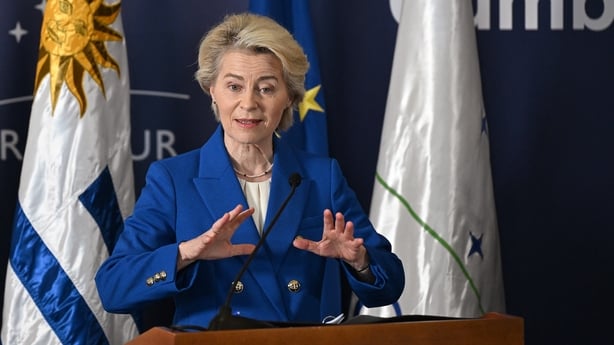
Again, making the Pact work so that voters do not feel the need to vote for the far right will not be easy.
Finally adopted in June this year, the Pact is ten pieces of legislation in all which will take two years to fully implement (coinciding with the Irish Presidency of the EU in 2026), with member states having to streamline their own legislation and put infrastructure in place to facilitate the operational aspects.
Far right parties have said it doesn't go far enough; NGOs have said it is draconian, with the International Rescue Committee warning that it "may well result in even greater human rights violations at Europe’s borders…[and] further rollback of people’s right to seek asylum, more detention at borders including for families with children, even fewer opportunities for people to have their asylum applications processed fully and fairly."
The new commission, however, with its preponderance of EPP commissioners, appears determined that progress is made in 2025.
Rise of far right
One country where the far right is expected to further exploit fears over migration is Germany, where the collapse of Chancellor Olaf Scholz’s SPD-Liberal-Green coalition in November will mean a general election in late February.
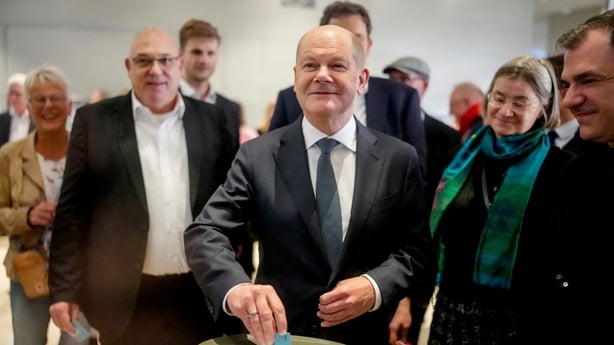
The Alternative for Germany (AfD) began as a fringe eurosceptic party ten years ago, but it has risen to become a major challenger to the status quo, even if its support base remains anchored in the east of the country.
In September, the AfD won a state election for the first time, scoring 33% in the eastern land of Thuringia, and a record return in Saxony.
Given Germany's history, the rise of the far right has meant an acute sense of alarm for mainstream European governments.
There is no doubt that the killing of three people at a festival in Solingen, allegedly by a Syrian man whose asylum application had been turned down, further fuelled support for the AfD.
However, while far-right parties have tended to moderate their anti-EU message since Brexit, that's not the case with the AfD.
In July 2023, the AfD's leader in Thuringia, Björn Höcke, said the EU "must die for the true Europe to live", a statement seen as a deliberate echo of Nazi sentiment over German military deaths in the Battle of Stalingrad.
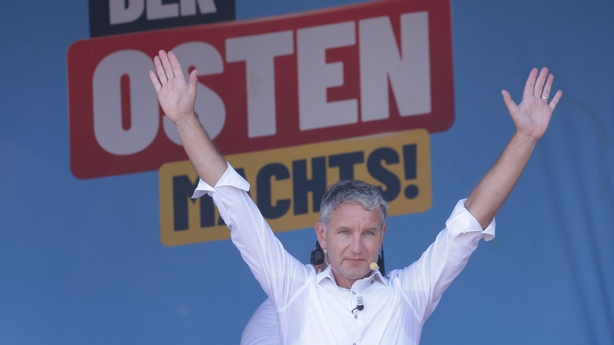
The AfD's anti-EU sentiment, and especially its support for Russia (and conversely its antagonism to Ukrainian refugees), mean it could further constrain Germany’s influence at EU level, where it remains by far the largest financial contributor.
In reality, Chancellor Scholz was already a reluctant player at EU level in key areas, delaying sanctions against Russia, rejecting the Mario Draghi report into reversing the EU’s economic decline, and opposing tariffs on Chinese electric vehicles.
While the AfD have struggled to govern in German states where they do well, due to the cordon sanitaire operated by other parties, this will not dent their rise at national level as we approach February's elections.
"A firewall will not dampen the AfD as a major regional force.
"Nor will it prevent the party from gaining seats in the Bundestag in 2025," wrote Sudha David-Wilp and Jackson Janes in a paper for the German Marshall Fund.
"In such a fragmented political environment, more challenges to the eroding abilities of the mainstream parties to establish sustainable governing majorities await."
That is why there is such a strong spotlight shining on Friedrich Merz, the leader of the opposition centre-right Christian Democratic Union (CDU), which has been enjoying poll ratings of between 30-34%.
Mr Merz was moulded in the years of Helmut Kohl and his staunchly pro-EU, Atlanticist policies, while he is also a fiscal conservative who was a close friend of Wolfgang Schäuble.
He has called for a reset in Germany’s relations with France and Poland and has been critical of Europe’s dependence on US military support when it comes to Ukraine.
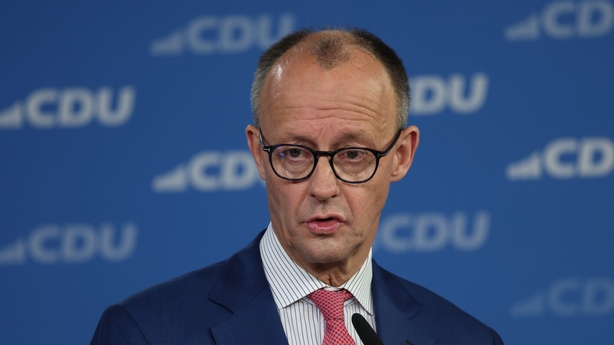
While Mr Scholz has staunchly refused to send the long-range, high-precision Taurus missiles to Kyiv, Mr Merz has publicly said it should have been done long ago.
He has needled Mr Scholz for being the "peace" chancellor.
"Peace you can find in any cemetery. It is our freedom that we must defend," he said.
Yet, Mr Merz has a distinctly "Germany first" ethos, and is reluctant to get into joint borrowing at EU level to meet the great challenges facing the continent (defence, competitiveness and enlargement).
"2025 will be dominated by Europe coming to terms with Donald Trump and preparing for a potential end to the war in Ukraine."
A Merz-led government "would seek to relaunch Germany’s place in Europe, focusing especially on France and Poland but also the Nordics and Baltics," wrote Jeremy Cliffe and Jana Puglierin in a paper for the European Council on Foreign Relations.
"Yet it would also bridle at putting serious German money behind this European reset.
"On China, it would be torn between an instinctive geopolitical hawkishness and a business-friendly inclination to hedge German bets."
How a victorious Mr Merz might gel with Ursula von der Leyen will be an intriguing prospect.
They are from the same political party yet he is said to have a cool relationship with the Commission President, at odds with her Migration Pact and the EU’s target of phasing out new combustion-engine vehicles by 2035.
Potential end to war in Ukraine
Either way, 2025 will be dominated by Europe coming to terms with Donald Trump and preparing for a potential end to the war in Ukraine.
The final summit of 2024 - attended by Ukraine’s president Volodymyr Zelensky - saw swirling speculation around security guarantees and peace-keeping forces in a post-war scenario.
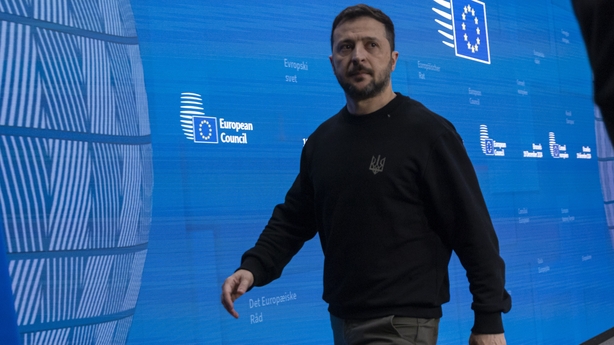
In reality, a debate is already well underway about European defence and the Russian threat, sharpened by Mr Trump’s threat to disengage from NATO and the historic US commitment to Europe’s defence.
The European Commission will publish a defence white paper within 100 days of taking office.
EU defence concerns
All EU member states - with the exception of Ireland, Malta, Cyprus and Austria - are now NATO members and it remains an article of faith that the transatlantic alliance is the main bulwark of European defence.
Yet, the EU appears determined to take on a greater role in terms of defence production, interoperability of equipment and the ability of national armies to mobilise quickly across EU borders if needed.
European countries - the UK included - scaled back defence spending after the end of the Cold War and are having to scale up at speed, both to provide Ukraine with weapons and to replenish their own stocks afterwards.
While NATO members have been accelerating defence spending to meet the alliance’s 2% of GDP target, the NATO Secretary General Mark Rutte has suggested the target should be more like 3% (Poland is already spending 5% of GDP).

Military experts have said the shortfalls are in ammunition, logistics and transport - the very areas the US excels in.
Furthermore, McKinsey estimates that Europe relies on five times the numbers of weapons systems the US does, meaning the continent struggles to produce at scale.
However, merging European defence champions is always politically difficult.
France always insisted that only EU companies should benefit from increased spending and Paris only dropped that insistence in November.
One suggestion is that Brussels redirect tens of billions of euro from the EU’s cohesion budget, a recognition that some member states simply don’t have the budgetary resources to spend more on defence.
Another suggestion, by Italy, Poland and Greece, is that the EU should underwrite common bonds to finance increased defence expenditure.
Germany, which is constrained by its national debt brake, and the Netherlands oppose this.
In Budapest, ahead of an informal EU summit in November, Taoiseach Simon Harris gave a qualified rejection of defence bonds.
"Ireland has very significant concerns in relation to common bonds…the fact that there are so many projects that Europe now needs to fund," he told reporters.
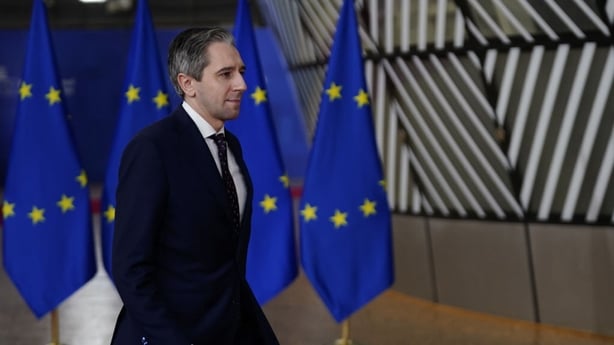
"Every conversation I go to at the European Council now is about new things that Europe must spend money on - really important things, the digital transition, climate and competitiveness, addressing infrastructural deficits, defence and security.
"I think there needs to be a much broader conversation about what the financial framework of the European Union looks like for the time ahead," he said.
However, there are certain to be further conversations in 2025 about defence bonds.
"France, Italy and Spain don’t have a lot of room to manoeuvre," said one industry source. "Their defence budgets won’t grow much. Italy and Spain are maxed out.
"The EU can raise up to €700 billion in debt over seven years, letting member states spend what they want to increase the overall pie and pool of resources."
Moves towards peace
As the year closes, speculation deepens about a ceasefire in Gaza, and peace negotiations over Ukraine.
Europe has been desperately divided on the former, and is genuinely fearful over the latter (a Russian victory in Ukraine would send millions more refugees heading west).
Yet, diplomats can still find room for hope amid a crystalising sense that, in advance of Mr Trump’s arrival, European capitals are finding resilience and determination on Ukraine and in general.
A new team is at the helm at the European Commission, and Kaja Kallas, the former Estonian prime minister, has hit the ground running as the EU’s new foreign policy chief.
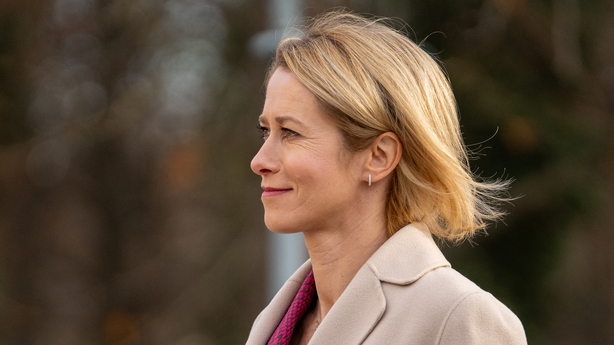
Antonio Costa, the former Portuguese prime minister, has taken over as president of the European Council and has already won plaudits for his strategic style and ability to focus conversations between 27 EU leaders.
"On the Middle East, it's been just such a grim situation in Gaza in particular," says one EU diplomat. "Broadly, there's a bit of despair.
"But, new leadership probably leads to a little bit of hope at European level that we could raise our game and be more unified and see more collective action.
"We'll see how long that lasts."







